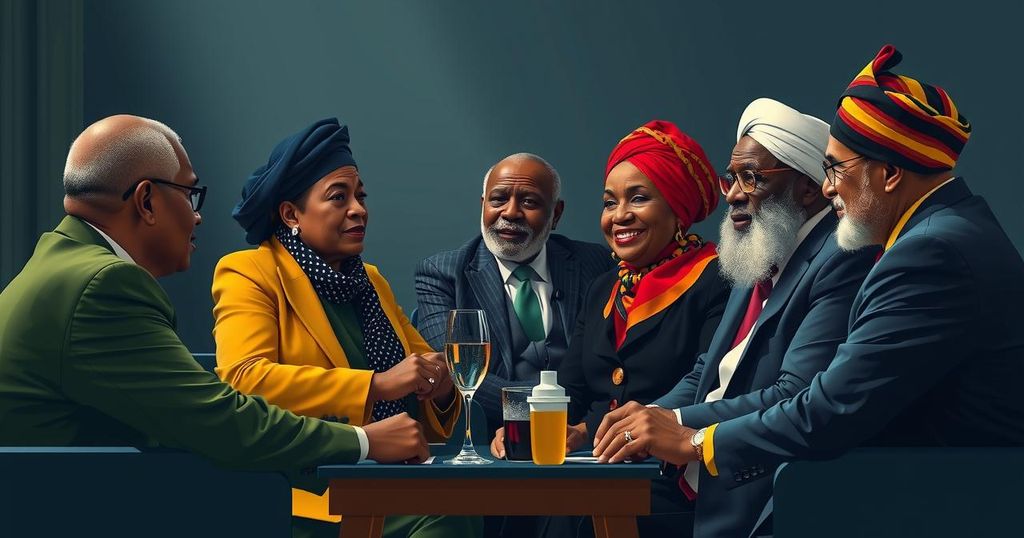Commonwealth Leaders Address Climate Change and Reparations in Samoa

Leaders from the Commonwealth are convening in Samoa to address climate change and reparations for transatlantic slavery, emphasizing the urgency of rising sea levels affecting many small island states. The summit includes discussions on food security, historical accountability, and the implications of the legacy of slavery on current inequalities, encouraging dialogue amongst member nations.
This week in Samoa, the leaders of the Commonwealth nations are convening for a significant summit focused on two pressing issues: climate change and reparations linked to Britain’s historical role in the transatlantic slave trade. This assembly includes representatives from 56 member states with historical ties to the British Empire, alongside His Majesty King Charles III. Discussions on Thursday included a meeting of the foreign ministers from these nations. A considerable portion of the Commonwealth consists of small states, notably low-lying island nations that face immediate threats from climate change, particularly rising sea levels. United Nations Secretary-General Antonio Guterres has noted alarming rates at which ocean temperatures are increasing in the Pacific Islands, stressing that populations in this region are particularly vulnerable to environmental changes. In a recent address, Australian Foreign Minister Penny Wong emphasized, “Climate change is an existential threat. It is the number one national security threat. It is the number one economic threat to the peoples of the Pacific and to many members of the Commonwealth,” underlining the urgency of the matter. Furthermore, African nations, including Zambia, have highlighted the dire implications of climate change for food security and overall sustenance for communities. In relation to the reparations issue, dialogue will aim to address Britain’s historical accountability for transatlantic slavery—a topic that is gaining prominence particularly among Caribbean and African nations. While British Prime Minister Keir Starmer stated that the UK would not formally discuss reparations during the summit, he expressed openness to engage with any member states wishing to explore the topic. The Caribbean Community (CARICOM) has launched a commission focused on securing reparations from former colonial powers, which further illustrates the urgency and significance of this issue. Proponents of reparations argue that the consequences of slavery have perpetuated significant racial inequalities, while opponents question the appropriateness of holding current nations accountable for past transgressions. Kingsley Abbott, the director of the Institute of Commonwealth Studies at the University of London, reinforced the importance of this discussion, proclaiming, “It is a priority for many of the Commonwealth’s member countries and whenever those affected by atrocities ask to talk, there should always be a willingness to sit down and listen.” Historically, from the 15th to the 19th centuries, over 12.5 million Africans were subjected to kidnapping by European ships and sold into slavery, with a significant number transported to labor under inhumane conditions in the Americas, particularly in Brazil and the Caribbean. The impacts of this legacy continue to resonate today, highlighting the need for critical dialogue within the Commonwealth community.
The Commonwealth comprises nations with historical links to the British Empire, formed to foster cooperation and unity post-colonization. With many member states being small island nations vulnerable to climate change, they face multifaceted challenges that require international collaboration. The historical context of slavery and its ongoing socio-economic implications resonate strongly among Commonwealth countries, especially those in the Caribbean and Africa, prompting calls for reparations as a means of addressing historical injustices and their lasting effects.
The Commonwealth Heads of Government Meeting in Samoa is a pivotal forum for addressing crucial issues such as climate change and reparations linked to transatlantic slavery. With significant threats posed by rising sea levels, particularly in vulnerable island nations, discussions are more critical than ever. Moreover, as the reparations dialogue evolves, it reflects ongoing struggles to reconcile historical injustices with contemporary realities. Engaging thoughtfully in these discussions will be vital for fostering relations within the Commonwealth and addressing the needs of its member nations.
Original Source: www.voanews.com






